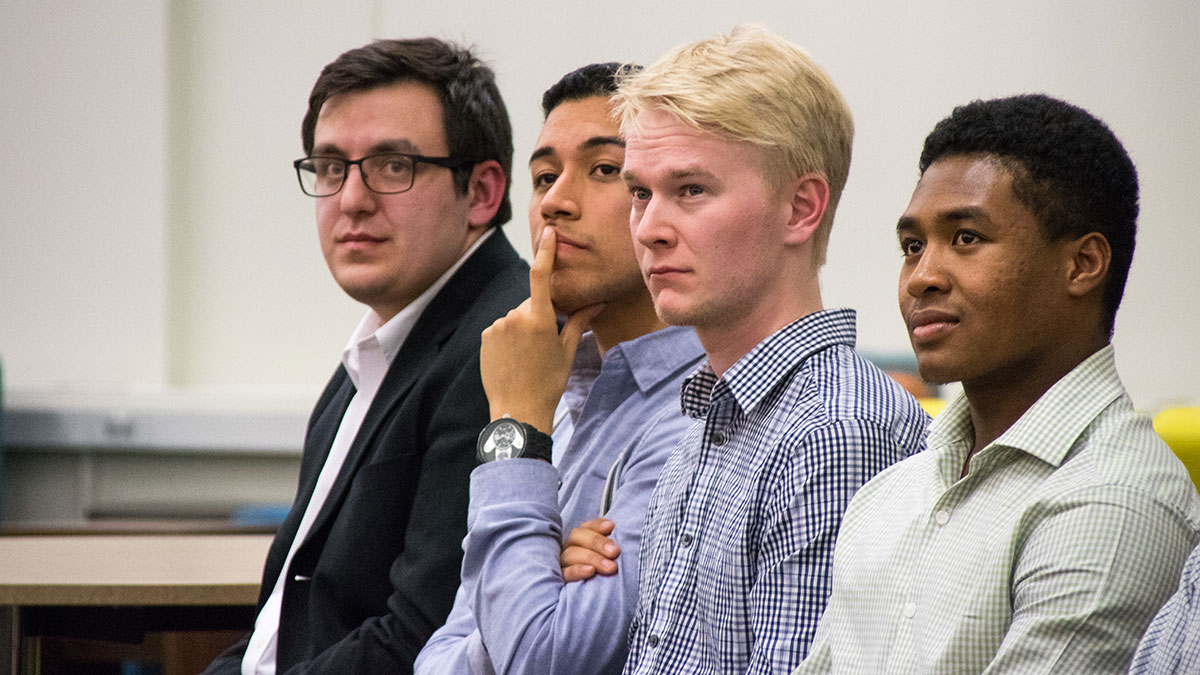Editorial: Class talks by SU candidates should be prohibited
 Christina Varvis
Christina VarvisUnquestionably the worst part of election season is the class talk.
As a third-year student, most of my classes have around 20 to 30 students, making it simply not worth the candidates’ time. My psychology class is different. With 171 students in the basement of Tory Lecture Theatres, it is an ideal target for candidates.
Last Thursday, one of the VP (Ops-Fi) candidates entered my class and (presumably) asked my professor whether he could make his pitch. I watched my prof say no, and the candidate left the room. After silently thanking the prof, I began to wonder why we allow class talks in the first place.
I’m not sure why anybody whose message is not directly relevant to the course (i.e. not a lecturer) would be allowed to speak in a class. Often, these speakers are cutting into lecture time, with pitches lasting up to a full five minutes into class. This is an unacceptable waste of student time, or, if you want to be more pragmatic, tuition.
That five wasted minutes represents a significant number of student dollars. If average tuition is $500 per class, and you spend 150 minutes per week in a 15-week semester, lectures will take around 2,250 minutes per semester. That means you spend around $0.22 per minute in lectures.
Though the $1.10 a five-minute intrusion costs you might not seem like much, if this is scaled up to the size of a 450-person intro level, that candidate just wasted $495 in student collective time. Multiply that by however many hundreds of classes are presented to in election season, and the waste increases exponentially.
It’s mind-boggling that this practice is deemed acceptable by the university. Though the Chief Returning Officer instructs candidates to speak to every prof before they do class talks, many do not follow this rule. This is especially true in the last days of the campaign, and a last push for votes. Compounded with the fact that candidates target entry-levels with (usually) more inexperienced professors, they are more likely to say “yes” to having candidates speak.
Though they can be a distraction, SU candidates represent the best-intentioned of presenters. Undoubtedly bringing more votes to the elections, hearing perspectives on student issues and being told to cast a ballot is much more palatable than other presentations I have heard in class.
We’ve all heard how we can make oodles of cash painting houses for the summer or ride elephants in Bali in class talks. Companies with essentially no interest in student well-being are allowed to market directly to a captive audience of hundreds of students, mostly first years who don’t know the difference between a summer job and a pyramid scheme.
For the life of me, I can’t figure out why the university allows this kind of policy to exist. Time in front of instructors is paid for by student tuition and government subsidy, and students deserve to not be interrupted in this period.
Taking all this into consideration, a blanket ban on pre-class talks is necessary. Though there are conventions in place surrounding them, those rules are broken so often the university cannot stand for the continuation of this practice. If the candidates who included “maximizing student value” in the platforms really believe in that, prohibiting class talks is a great place to start.





If you’re going to suggest prohibiting one of the few ways we have to reach out to voters during the campaign, I’d also like to hear any suggestions you have to fill the void left behind. We don’t have many options when it comes to reaching the electorate, especially considering the campaign period is less than 2 weeks and the election isn’t hyped up much until a week or two prior to reading week. Voter turnout this year was down from last year, and by eliminating one of the few avenues we have to connect to students in only 11 days, that would mean choosing between ramping up other means of communication or interacting with fewer students.
You argue that students time equals money which is true. Students pay tuition to hear the professor speak, not us candidates. Which is why there are regulations in place (which as you had mentioned, were broken this year) to prohibit candidates from speaking to a class during class time without the permission of the instructor. In years past, verbal permission was all that was required. This year, the CRO explicitly stated that written permission must be obtained in advance of any class talk. And unbeknownst to most, students/voters have the right to lodge a complaint against a candidate if they are found to be breaking said rules, as is what happened last year when a student came forward against Sleiman. But when the rules themselves aren’t really communicated clearly to anyone than the candidates, nobody knows what to complain against.
When I was requesting permission to speak to classes, I explicitly stated that my speeches were to take place prior to the commencement of class. And as Navneet alluded to, if I began to encroach on class time, I was often cut off and asked to leave. However there was a couple of classes where the instructor polled the students to see if they’d like to hear more and/or ask questions.
In addition, I don’t share your opinion when you say that classes of 20 to 30 students are “simply not worth the candidates’ time”. While I’ve heard that most candidates did tend to focus on 100+ lecture halls, I did talks in classes ranging from 350+ filled seats to a class of 12. And while I may have had 5-10% of people in the larger classes listening to some degree, every single person in the 12-person class was listening, engaged and even taking notes. Some also asked questions. These smaller classes tended to be more engaged and possibly more willing to share the word among their friends and peers than those in a large crowd. I appreciated the opportunity to speak with each and every person who was willing to give me a few minutes of their time and while it may seem that larger rooms are more ideal targets for candidates, large packed rooms do not always equate to an attentive audience.
tl:dr I couldn’t disagree with this more.
I agree with Donald on this one. In my experience, when a class talk is presented, it’s during the few minutes before class actually begins and if the talk does happen to start going into class time the prof often cuts in or tells the candidate to wrap it up. As well, the candidates who are pitching their ideas to students are there because they care about students and want to engage them in the conversation. By reminding students of the election and of the various platforms, they are trying to get as many students as possible to talk about issues that directly affect their university experience. Would we rather have candidates who don’t bother to actively interact with students or voice their opinions/plan of action? Furthermore, it would become extremely difficult for candidates to spread their ideas to a large audience of students if class talks were banned. They are after all only given a few days to campaign and get their ideas out there – so class talks serve a purpose in terms of efficiency as well.
Apart from class talks related to SU elections, many of the other presentations that are allowed (the ones that focus on volunteer, job, or travel opportunities) are again also for the benefit of students. A large portion of the opportunities presented are meant to enrich the student experience on campus and essentially give students the opportunity to do more than just go to lectures and hand in assignments. Often, with the numerous ways to get involved on campus, students get overwhelmed and therefore a class talk can be more effective than a poster that most people will walk by anyways. To sum up, while I completely understand where you are coming from in terms of the large sum of tuition we are paying for every minute we are in lectures, it is unfair to deprive students from sharing ideas or opportunities they are passionate about during the few minutes before class when most students in the lecutre are wrapping up their text messages or getting out their notebooks anyways.
I’m confused, candidates come and talk in only that 10 minute grace period that there’s no class, never during class to my understanding. No class is taught during this time, so how are students losing valuable class time, as this article is saying?